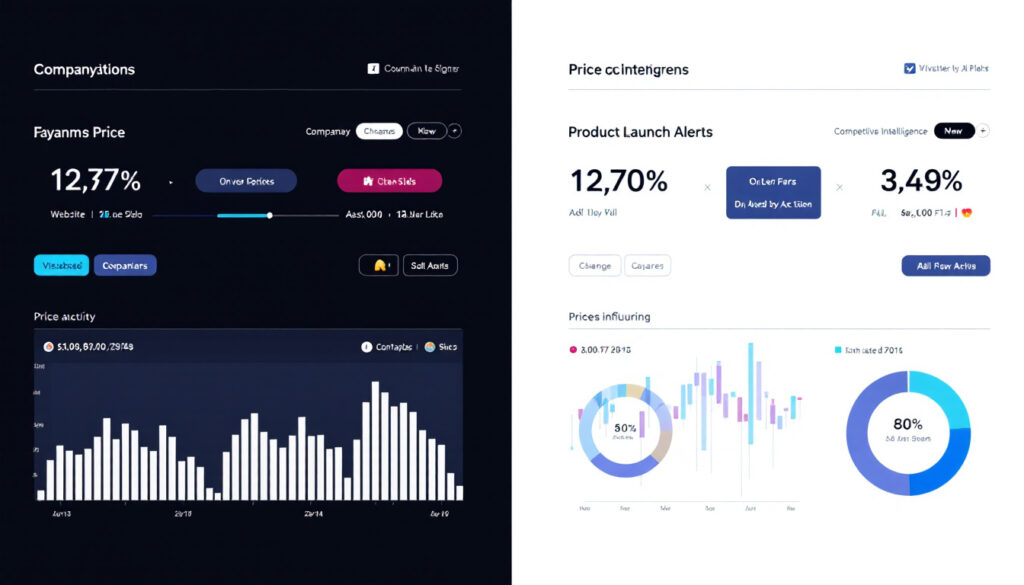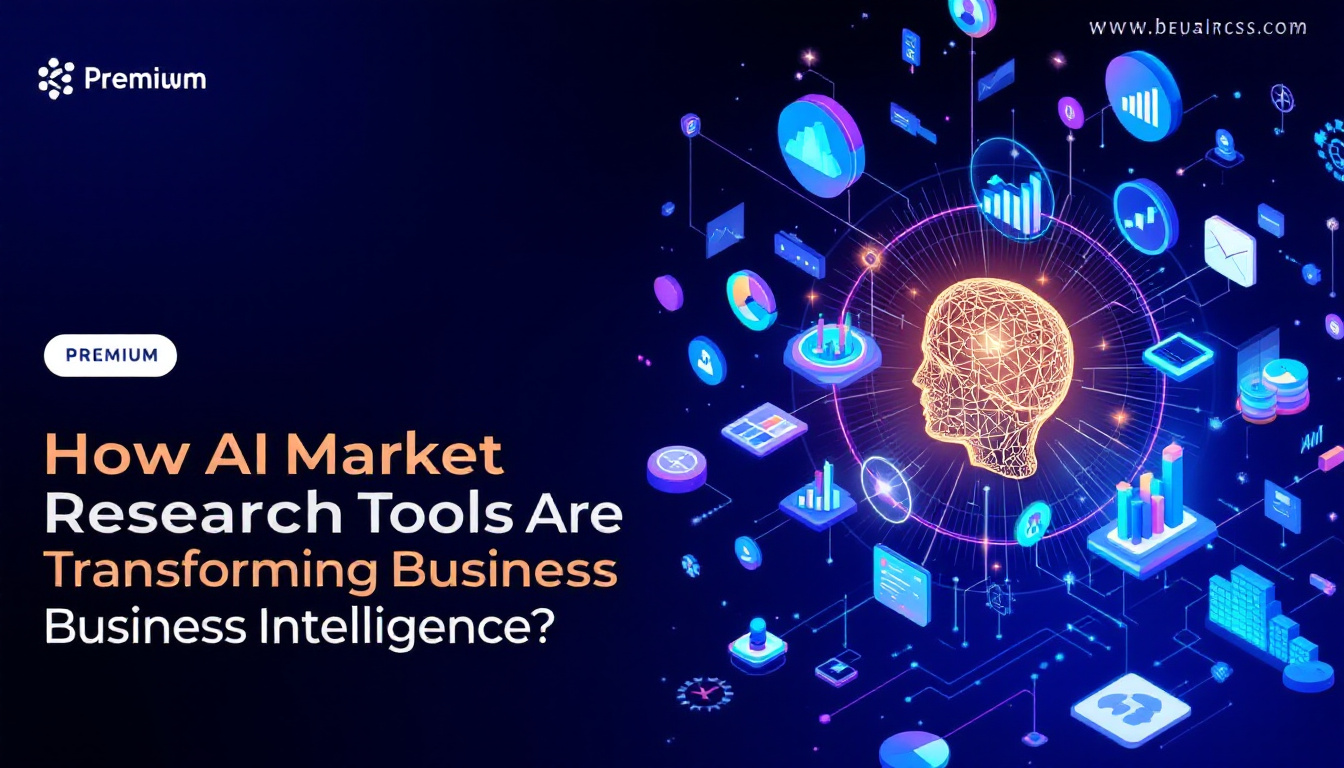Not long ago, gathering market insights meant face-to-face interviews, manual spreadsheets, and hours spent trying to spot patterns. Today, market research tools AI make it possible for companies to understand what’s happening in their market faster and more accurately. These tools deliver real-time data and reduce the guesswork that came with older methods. More teams are switching from outdated software to smarter platforms, making it easier to collect, sort, and act on information with greater confidence.

Why AI Market Research Tools Stand Out ?
Traditional research often involves slow, hands-on work—surveys, spreadsheets, and delayed reports. With AI, much of this work gets done automatically. These new tools scan for trends, read feedback, and predict what might happen next, all with less need for manual effort.
Key Benefits of AI Market Research Tools
- Speed: Handle large amounts of data in a fraction of the time.
- Accuracy: Machine learning catches mistakes and reduces bias.
- Efficiency: Find patterns in big sets of data that would take a team weeks to process.
Powerful AI Features in Modern Tools
- Natural language processing (NLP) helps make sense of open-ended responses.
- Automated charts and graphs pinpoint important patterns.
- Predictive analytics help spot future trends.
- Real-time reports bring fresh data as soon as it’s available.

Automated Data Collection and Analysis
AI-driven market research tools automate the long process of gathering information. They scan surveys, social media, online reviews, and competitor websites to collect and organize data. The software can:
- Bring together data from many sources at once.
- Clean and sort raw information so it’s ready to use.
- Instantly highlight what matters most.
Manual research often means hours spent reading messages or updating endless spreadsheets. AI speeds things up and makes it easier to trust your results, giving your team more time for strategy.
Deeper Insights with Natural Language Processing
NLP helps AI market research tools do more than just count numbers. These systems read the meaning behind words found in reviews, surveys, and social posts. They can:
- Measure how people feel—positive, negative, or neutral.
- Find the keywords and themes people mention most.
- Pick up on trends in the language your customers use.
With NLP, brands get a better sense of what their customers think and feel, which leads to smarter marketing and product choices.
Predictive Analytics: Planning with Confidence
AI tools use predictive analytics to turn old data into smart guesses about the future. By studying past sales, campaigns, or market shifts, these tools help you:
- Plan for changes in what customers want.
- Set more realistic budgets.
- Spot new risks or opportunities before they hit.
Good forecasting means you can act early, not just react to last quarter’s reports.

Best AI Market Research Tools for 2025.
Choosing the right AI tool can be tough with so many choices. Here’s a look at some of the top market research tools AI for 2025, each with its own strengths.
SurveyMonkey Genius
SurveyMonkey Genius upgrades survey results with AI insights. It quickly reviews responses, finds patterns, and suggests how you can improve your questions.
Features:
- Automatic analysis and easy-to-read visual reports.
- AI feedback for writing better survey questions.
- Fast discovery of hidden themes.
Best for: Teams who need clear results from their own survey data.
Brandwatch for Social Listening
Brandwatch tracks what’s being said about your brand on social media. Its AI reviews posts, hashtags, and public mood across platforms like X (Twitter), Facebook, and Instagram.
Features:
- Watches millions of conversations online.
- Spots changes in public opinion right away.
- Custom reports for comparing brands.
Best for: Teams that need to watch their reputation or find new trends as they happen.
Crayon for Competitive Intelligence
Crayon monitors thousands of online sources for any changes from your competitors. It tracks things like website updates, pricing changes, and new product launches.
Features:
- Daily updates on what competitors are doing.
- Instant alerts when something big changes.
- Timeline views to track changes over time.
Best for: Companies in crowded markets that need fast, reliable competitor updates.
SEMrush Market Explorer and Similarweb
SEMrush and Similarweb both help businesses research digital markets, but in different ways. Market Explorer looks at market share, growth, and audience overlap. Similarweb gives detailed website and traffic stats.
Features (SEMrush Market Explorer):
- Maps out market audiences.
- Finds growth and market niches.
- Compares competitors side by side.
Features (Similarweb):
- Detailed breakdowns of web traffic and sources.
- Insights on audience interests and referrals.
- Data on new and rising competitors.
Best for: Teams who want a full view of their online market and clear benchmarks.
ChatGPT for Market Analysis
ChatGPT acts as a virtual assistant for market research. It answers questions, summarizes reports, and builds custom research documents using public data. Its language skills make it good for pulling insights from news or creating quick market updates.
Features:
- Quick summaries of market data.
- Creates tailored reports.
- Simple competitor and trend research from prompts.
Best for: Teams that need flexible, on-demand insights or want to add another layer to their research.
Bringing It All Together
Market research tools AI bring more speed, reliability, and insight to business intelligence. Some platforms are best for surveys, others for social media or tracking competitors. The right tool for your team depends on your goals, data sources, and budget. As AI continues to improve, expect even smarter options that help your business stay ahead. Focus on the data and decisions that matter most, and choose tools that turn raw numbers into clear, practical insights.
To contact us click here .


I’ve recently started a site, the information you offer on this site has helped me tremendously. Thank you for all of your time & work.
Wow! This can be one particular of the most helpful blogs We have ever arrive across on this subject. Actually Fantastic. I am also an expert in this topic so I can understand your effort.
Some truly fantastic work on behalf of the owner of this website , perfectly great subject matter.
you have got an ideal weblog here! would you like to make some invite posts on my weblog?
Hello there, just was aware of your weblog thru Google, and found that it is really informative. I’m going to watch out for brussels. I will appreciate for those who continue this in future. Lots of people will be benefited out of your writing. Cheers!
Thanks for sharing. I read many of your blog posts, cool, your blog is very good. https://accounts.binance.com/en-NG/register?ref=YY80CKRN
excellent post, very informative. I wonder why the other specialists of this sector do not notice this. You must continue your writing. I am sure, you have a huge readers’ base already!
link 188v khuyến khích người chơi cá cược có trách nhiệm và luôn cung cấp các công cụ kiểm soát rủi ro tài chính hiệu quả. TONY01-25
188v no hũ không chỉ là nhà cái – đó là hệ sinh thái giải trí toàn diện: thể thao, casino, bắn cá, e-sports và đặc biệt là slot siêu hot. TONY01-25
**aquasculpt**
aquasculpt is a premium metabolism-support supplement thoughtfully developed to help promote efficient fat utilization and steadier daily energy.
**prostafense reviews**
ProstAfense is a premium, doctor-crafted supplement formulated to maintain optimal prostate function, enhance urinary performance, and support overall male wellness.
**boostaro official**
Boostaro is a purpose-built wellness formula created for men who want to strengthen vitality, confidence, and everyday performance.
**neurosharp**
Neuro Sharp is an advanced cognitive support formula designed to help you stay mentally sharp, focused, and confident throughout your day.